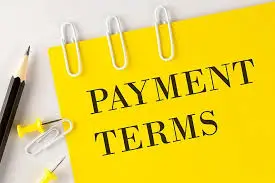By: Ritika Puri
What are payment terms?
Payment terms are an agreement that outlines how, when, and by what method your customers or clients provide payment to your business.
Payment terms are an agreement that outlines how, when, and by what method your customers or clients provide payment to your business. They’re the backbone of healthy cash flow for any business.
When you’re running a business, it’s critical that payments owed to you are paid in a timely manner to keep your own bills paid and the lights on. Business owners, self-employed workers, and individuals tasked with managing an operation’s finances need to know how to craft invoices that lay out clear and concise payment terms.
Understanding common payment terms and how to use them in the invoicing process can encourage clients to pay properly and on time. The more you know about payment terms, the easier it will be for you to pick the right approach for your business’s sales.
Payment terms and invoicing are often more relevant for service-based businesses and those that sell goods at high prices. For instance, laying out strict payment terms in an invoice might be the best choice for a lawn care company that provides services on a schedule, but wouldn’t make sense for a coffee shop selling directly to its customers.
What are contract payment terms?
Payment terms are an agreement that sets your expectations and outlines how, when, and by what method your customers or clients provide payment to your business. Typically associated with invoice payments, transparent contract payment terms can make it easier for your customers to understand your billing process, including in instances of a late or missing payment.
Why are contract payments important?
Contract payment terms are important because knowing how much money is going to hit your account and when is essential to accurate cash flow projections. Accurate cash flow projections help you plan for taxes, keep your business running smoothly, manage business growth and monitor if you receive payments on time.
Having clear contract payment terms also helps protect your business if there’s ever a disagreement or confusion about payments. You can refer back to them if a customer questions a charge or requests a refund.
How to use payment terms:
You use payment terms to outline when and how your clients should pay to ensure clean, consistent transactions. They’re essential when negotiating a contract. An effective set of payment terms should benefit both parties by maximizing how quickly your clients pay and minimizing inconvenience for your customer. To maintain a healthy business, remember that your payment terms should match your business plans and align with your business’s typical sales lifecycle. Always include your payment terms on invoices.
Who determines payment terms?
The business providing the product or service usually sets the payment terms. As the seller, you get to decide what works best for your cash flow, industry standards, and business needs.
However, for B2B payments or larger projects, there is more flexibility. For example, clients may request terms that better suit their budget, like extended payment timelines or installments. In these cases, negotiating terms is important to ensure both parties benefit, so you give your client reasonable flexibility while maintaining the cash flow your business needs.
When are payment terms created and updated?
Payment terms should be created prior to sending out an invoice and should be updated any time the payment structure changes. Always include payment terms on your invoices, and make sure the terms outlined in your agreements match those stated on your invoices. This helps avoid confusion and ensures a smooth transaction. Any discrepancies between the two can lead to payment delays or disputes.
Whether you need bookkeeping help or have questions, as you navigate the invoicing process, you can connect with QuickBooks Live Expert Assisted to get coached—or even offload some work.

